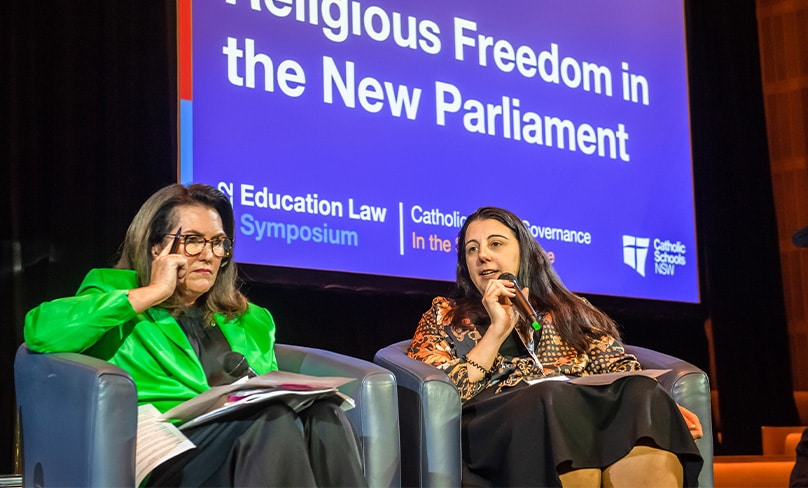
NSW Labor Senator Deborah O’Neill has reaffirmed the Albanese government’s commitment to introducing new laws in the current parliament, allowing for religious schools to preference people of that same faith in their selection of staff.
Senator O’Neill was speaking in a panel discussion, “Religious Freedom in the New Parliament” at Catholic Schools’ NSW 2022 Education Law Symposium on 29 September which brought together teachers, principals and other educational leaders from Catholic schools across the state.
The Central Coast-based senator, herself a former secondary teacher and university lecturer in teacher education, said Labor acknowledges the key role religion plays in the lives of many Australians and believes legislation should be passed to protect people of faith.
“The sense of religion as a private matter that’s just focused on inside a church or inside the gates of a religious school- fundamentally neglects the power of religion to transform lives”, Senator O’Neill told the symposium.
“We can’t deny that there is discriminatory practice against people of religion and I think the time has come where both sides of politics need to unite to find a way forward and provide those protections for people of religion.”
“If you’re an Islamic woman and someone pulls your hijab in public, where is your protection? That’s a fundamental attack on someone’s right to manifest their faith in public”, she added.
“We’re seeing incredible hate crime, particularly anti-semitism and you now need security guards outside Hillsong Church. That is the reality and in those situations, we can’t deny that there is discriminatory practice against people of religion and I think the time has come where both sides of politics need to unite to find a way forward and provide those protections for people of religion”.
Fellow panel member and former Federal Liberal MP and one-time Human Rights Commissioner, Tim Wilson, questioned the merit in passing religious discrimination laws, arguing it could end up doing more harm than good for religious institutions including Catholic schools.
“The proposed religious discrimination bill has shifted the conversation from the rights of institutions towards the rights of individuals”, Mr Wilson explained.
“Most laws in this space are traditionally focused on institutions. There is a risk when you focus on individuals that the laws effectively become a pathway to trumping the rights of others and I believe we need to have a proper conversation not just on individual’s rights but also individual’s responsibilities around religious discrimination laws.”

Another member of the panel, Catholic Weekly columnist and the Archdiocese of Sydney’s Director of Public Policy and Engagement, Ms Monica Doumit, believes the debate up to now around religious discrimination laws has highlighted some fundamental risks for Catholic schools.
“We know that when the religious discrimination bill was before parliament in February this year, there was a vote in the House of Representatives to repeal Section 38 which allows faith-based institutions to discriminate against students on the basis of their sexual orientation or gender identity.”
“While we all sit here and agree that no-one wants to discriminate unjustly against a student based on their sexual orientation or gender identity, the way that plays out can have concerning consequences”, Ms Doumit explained.
“For example, what if you have a student who says they experience same-sex attraction? Unless you provide sex education that includes homosexual and heterosexual activity, then the student could claim they are being discriminated against because they are being denied a benefit in the form of relevant sex education”.
“What happens if you have a student who transitions in a school? What happens to the other students? Are they required to use that student’s preferred names and pronouns? Will they get punished if they don’t?”
“While we all sit here and agree that no-one wants to discriminate unjustly against a student based on their sexual orientation or gender identity, the way that plays out can have concerning consequences.”
“While as much as we want to focus on the individual student or teacher, we also need to consider the impact this can have on the Catholic community more generally. What do you say to a parent who chooses to send their children to a Catholic school so they are formed in the Catholic faith?”
“The difficulty we will have is in keeping the activists out of our schools and we’ve indeed seen cases here in NSW of activists trying to get into schools just to make a point” Ms Doumit said.
Senator O’Neill told the symposium, Catholic schools have always had students enrolled from different sexual orientations and she believes schools need to show tolerance towards everyone.
“We simply need to make enough space for the unique creation of each human person. In the Catholic tradition, there are a range of views about many issues of morality and they’re constantly interrogated to become more Christ-like. The journey of faith is not one of certainty- it’s one of doubt, forgiveness and space for others”.
Related Articles:
